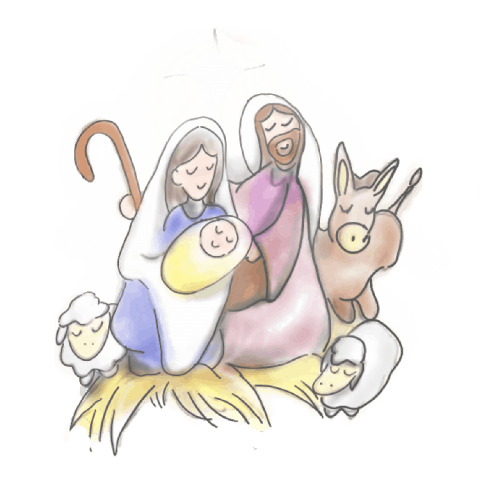Religion isn’t the point — extending Christmas greetings is a Canadian commitment.
Despite the fact that the vast majority of Canadians across all religious and cultural backgrounds celebrate Christmas every year, there is still a push to take out the religious aspects of the holiday — first and foremost, the word Christmas itself.
 Let’s be realistic — Christmas is already a secular occasion. Due to commercialism, a large portion of the population buys gifts, decorates a tree and has family over for dinner without ever brushing up on the religious parts of Christmas.
Let’s be realistic — Christmas is already a secular occasion. Due to commercialism, a large portion of the population buys gifts, decorates a tree and has family over for dinner without ever brushing up on the religious parts of Christmas.
The inclusivity of Christmas is what makes it so great. It doesn’t matter whether people know or care about the holiday’s religious importance. As long as you have some Christmas spirit, and the decency to wish people “Merry Christmas,” anyone can participate in the largest national celebration of the year.
It’s very important to remember that Christmas is a national holiday. As Canadians, we have recognized that the majority of this country’s citizens, as well as its founders, celebrate Christmas, which is why it is celebrated nationally by Canada.
Taking Christ out of Christmas would destroy not only its religious aspects but also the national unity that the holiday creates. I would argue that Christmas has now transcended its religious roots and evolved into a national celebration, which warrants our participation simply by virtue of being Canadian.
To say that Christmas is primarily a religious ceremony is a complete misunderstanding of what Christmas really means. It is not an exclusive event that is only open to Christians, but instead, simply a season of festivity for everyone in the community — and it always has been.
More importantly, if we remove the word Christmas, what are we even celebrating? Are we seriously going to decorate a “holiday” tree, have a “winter” dinner and then exchange gifts — all the while pretending that this is a completely secular event, with no religious affiliations whatsoever?
No — whether we like it or not — Christmas started out as a religious holiday, and I don’t think that’s a bad thing. We can all enjoy chocolate at Easter, candy at Halloween and drinks on St. Patrick’s Day without being bombarded by reminders about their religious importance. Christmas should be no different.
Try to think of Christmas as if it were a university class. While people treat the religious aspects like unnecessary assignments that interfere with their enjoyment of the holidays, these aspects are really more like suggested readings — completely optional, but available if we ever want additional information.
However, many people still refuse to say “Merry Christmas,” arguing that to adopt the greeting is to participate in a celebration of something unimportant to them or that is contrary to their beliefs. To them, I politely say, suck it up.
Maybe you’re bitter, because you’ve sat through too many boring family dinners, school Christmas concerts and hockey games played by your distant cousin. Consider, however, that although hockey and turkey stuffing might not hold as much value to you, it is likely important to some of your friends and family. We should value our relationships with those around us, and that alone should be enough to make you say “Merry Christmas.”
At the bare minimum, let’s keep saying “Merry Christmas” simply out of respect. We might not all put out a nativity scene, go to church or even say grace before supper — but at the very least, we can pay our respects to the rest of our fellow citizens, to Canada’s religious founders and to this great country of ours. It’s the least we can do.
—
Wyatt Bernier
Graphic: Jina Bae
This city, this province, this country is not your place but the place of many.
In December, we think of beautiful snow and fatty foods that facilitate hibernation. The month also includes many celebrations that bring people together — like Hanukkah, Kwanza and end-of-finals karaoke at Flint. Christmas, however, is currently getting special attention because of the supposed war the holiday is facing.
Let me be clear — there is no war on Christmas. In 2016, Statistics Canada reported that the Christmas-tree industry is valued at $78.4 million, a 26.1 per cent increase from the year before. The business of Christmas is alive and well in Canada — and there is no end in sight.
The assumed war on Christmas stems from the fear that other religions will take over one’s own or that the dominant culture will have to make room for others. Consider Trump’s presidency, with claims that he will ensure “that we [will] be saying ‘Merry Christmas’ again.” But, did people ever stop saying “Merry Christmas”?
Here is the reality — Canada is not a Christian country. There may be Christians here, but it is not Christian by default. Today’s Canada is young and still trying to find an identity. It’s full of different backgrounds, religious prescriptions and cultures. Even if one does not adhere to the notion that diversity is our strength, the fact that holidays based on Christian beliefs are not celebrated by all cannot be disputed.
Religion, and whatever stems from it, is part of the private realm of one’s life. In this pluralistic society, we all live together, and in our public settings, we conduct our social business in an irreligious manner. Eating out at a restaurant, shopping for a sweater and taking public transit are not inherently religious activities. During leisure time, you can choose to pray or meet with fellow people of similar faith.
Choosing to greet others with a more neutral greeting like “Happy Holidays” in December is not a malicious act against Christmas or any other religious event in this month, but rather, it is an understanding of the difference between the public and private realms in which we live.
I am not asserting that “Merry Christmas” should never be uttered — it would be absurd to have such a restriction on language. If you know the person is celebrating Christmas, say it. If your friend is celebrating Hanukkah, wish them a “Happy Hanukkah” — you can even say “Happy Winter Solstice” to neo-pagans.
When you’re in the public realm — with people whose private lives are unknown to you — a greeting that encompasses all of the possible holidays and acknowledges and respects everyone in our society seems to be the most appropriate.
Celebrating Christmas should involve you, your family and your loved ones — not societal dominance. Not everyone’s lives revolve around Christmas, and it is time to stop expecting everybody to bend over backwards for one specific faith.
—
Joshua Brand
Graphic: Jina Bae
Leave a Reply